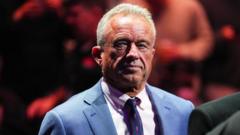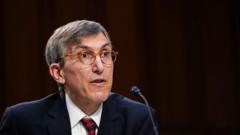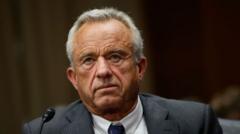Kennedy’s controversial approaches could shake up US food regulations and combat chronic health issues associated with ultra-processed foods.
Kennedy's Ambitious Plans to Transform America's Food System

Kennedy's Ambitious Plans to Transform America's Food System
RFK Jr. aims to eradicate unhealthy diets and reform food safety regulations in his role as HHS leader.
In a bold move aimed at improving public health, Robert F. Kennedy Jr. has set his sights on transforming America's dietary landscape. The President-elect Donald Trump’s choice to lead the Department of Health and Human Services (DHHS) is determined to tackle the pervasive issue of ultra-processed foods that he claims are detrimental to American health. During a recent rally, Kennedy passionately remarked, "We are betraying our children by letting [food] industries poison them," reflecting his commitment to reforming how Americans eat and drink.
Kennedy faces significant challenges as he endeavors to change food regulations and combat the powerful forces within Big Food. Nutrition expert Marion Nestle noted that Kennedy's plan to address junk food might face considerable opposition, questioning whether Trump would lend his support. With his controversial history—including unfounded claims linking vaccines to autism—it’s important to note that Kennedy still needs Senate confirmation to assume his role.
Despite skepticism surrounding his health claims, Kennedy has garnered support from various quarters, including health experts and lawmakers. Colorado's Democratic Governor Jared Polis welcomed his nomination and stated that Kennedy could potentially invigorate the DHHS and FDA in the fight against chronic diseases. Under his slogan “Make America Healthy Again,” Kennedy promotes eliminating ultra-processed foods—those laden with added fats, sugars, and starches—from American diets, particularly in schools.
The FDA, tasked with overseeing the safety of pharmaceuticals and food in the US, is also in his crosshairs. Kennedy has positioned himself as a reformer who intends to significantly shake up the agency, even vowing to terminate employees he believes contribute to a “corrupt system.” His agenda includes halting the use of various food additives and dyes, like Red No. 3, which have faced scrutiny for their potentially harmful effects.
While many public health experts are rallying behind the idea of mitigating the consumption of ultra-processed foods, concerns remain about some of Kennedy’s more radical stances, such as banning fluoride in drinking water and promoting raw milk consumption. Epidemiology experts warn about the dangers of unpasteurized milk, while others stress the proven benefits of fluoride in dental health, emphasizing that such measures fall outside Kennedy's jurisdiction.
Implementing his vision will not be straightforward for Kennedy. Experts caution that sweeping reforms in food regulation will face resistance from industry stakeholders, as both the USDA and FDA share authority over food policies. Kennedy's proposals have sparked lobbying efforts by food industry groups aiming to prevent his agenda from disrupting their operations. Even within the Trump administration, tensions arise given the former president’s affinity for fast food, which diverges from Kennedy’s health-oriented approach.
Although Kennedy’s lofty goals of eliminating ultra-processed foods may be politically challenging, there might still be pathways for change within existing regulatory frameworks. Some nutrition experts suggest Kennedy focus on modifying the U.S. Dietary Guidelines, which influence school meals and government nutrition programs, thereby making a significant impact on the food industry without extensive upheaval.
Yet, concerns linger about the methods Kennedy proposes to realize his vision, particularly his intent to dismiss FDA nutrition experts, potentially undermining food safety. Balancing legitimate health improvements with Kennedy's controversial health claims presents a substantial challenge. While there are opportunities for progress, a deeper examination of the implications of Kennedy's approach may be necessary as America grapples with reforming its food systems.
Kennedy faces significant challenges as he endeavors to change food regulations and combat the powerful forces within Big Food. Nutrition expert Marion Nestle noted that Kennedy's plan to address junk food might face considerable opposition, questioning whether Trump would lend his support. With his controversial history—including unfounded claims linking vaccines to autism—it’s important to note that Kennedy still needs Senate confirmation to assume his role.
Despite skepticism surrounding his health claims, Kennedy has garnered support from various quarters, including health experts and lawmakers. Colorado's Democratic Governor Jared Polis welcomed his nomination and stated that Kennedy could potentially invigorate the DHHS and FDA in the fight against chronic diseases. Under his slogan “Make America Healthy Again,” Kennedy promotes eliminating ultra-processed foods—those laden with added fats, sugars, and starches—from American diets, particularly in schools.
The FDA, tasked with overseeing the safety of pharmaceuticals and food in the US, is also in his crosshairs. Kennedy has positioned himself as a reformer who intends to significantly shake up the agency, even vowing to terminate employees he believes contribute to a “corrupt system.” His agenda includes halting the use of various food additives and dyes, like Red No. 3, which have faced scrutiny for their potentially harmful effects.
While many public health experts are rallying behind the idea of mitigating the consumption of ultra-processed foods, concerns remain about some of Kennedy’s more radical stances, such as banning fluoride in drinking water and promoting raw milk consumption. Epidemiology experts warn about the dangers of unpasteurized milk, while others stress the proven benefits of fluoride in dental health, emphasizing that such measures fall outside Kennedy's jurisdiction.
Implementing his vision will not be straightforward for Kennedy. Experts caution that sweeping reforms in food regulation will face resistance from industry stakeholders, as both the USDA and FDA share authority over food policies. Kennedy's proposals have sparked lobbying efforts by food industry groups aiming to prevent his agenda from disrupting their operations. Even within the Trump administration, tensions arise given the former president’s affinity for fast food, which diverges from Kennedy’s health-oriented approach.
Although Kennedy’s lofty goals of eliminating ultra-processed foods may be politically challenging, there might still be pathways for change within existing regulatory frameworks. Some nutrition experts suggest Kennedy focus on modifying the U.S. Dietary Guidelines, which influence school meals and government nutrition programs, thereby making a significant impact on the food industry without extensive upheaval.
Yet, concerns linger about the methods Kennedy proposes to realize his vision, particularly his intent to dismiss FDA nutrition experts, potentially undermining food safety. Balancing legitimate health improvements with Kennedy's controversial health claims presents a substantial challenge. While there are opportunities for progress, a deeper examination of the implications of Kennedy's approach may be necessary as America grapples with reforming its food systems.




















